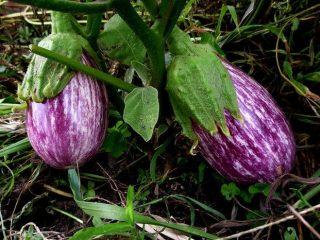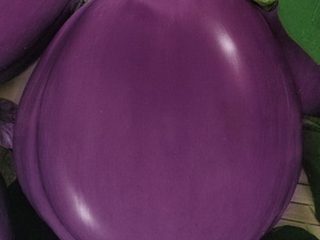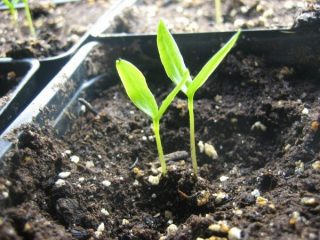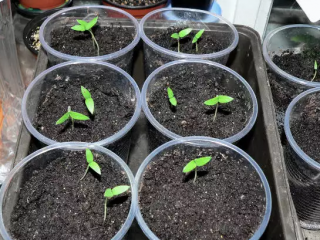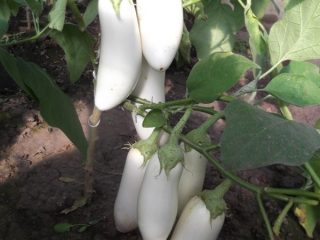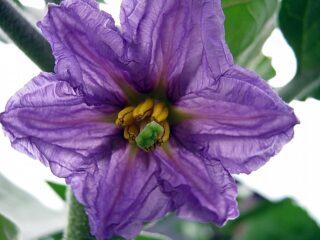Content
Spraying eggplants with boric acid is carried out 2-3 times per season. This procedure promotes the formation of ovaries, improves nitrogen absorption, develops the root system and increases disease resistance. For spraying, prepare a solution of a standard concentration of 2-2.5 g of powder per 10 liters of water. It is first dissolved in a hot liquid and then brought to the total volume.
What is boric acid
Boric acid is an inorganic (mineral) acid with the formula H3B.O.3. Most often it is produced in the form of a powder containing small crystals (like scales). They are colorless, shiny in the light, and a little greasy to the touch. The powder dissolves well in water, but only in hot water (optimally 60-70 degrees).
The acid is used in gardening as an antibacterial and antifungal agent. For example, you can use it to pickle the seeds of eggplants and other plants.In addition, it replenishes the deficiency of one of the most important microelements - boron, which promotes the formation of ovaries, improves the taste of fruits, and helps to absorb other compounds (for example, nitrogen).
Boric acid for treating eggplants and other plants in its pure form (powder) can be purchased at pharmacies and special stores for summer residents. It is also included in some fertilizers, for example:
- "Borofoska";
- "Organo-boron";
- "Mag-Bor".
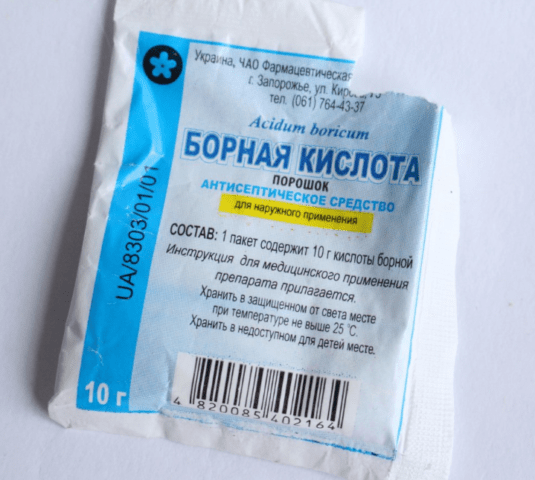
You can buy boric acid at an affordable price at a pharmacy
Benefits for eggplants
Eggplants are sprayed with boric acid for various purposes. Despite the fact that this microelement is required in small volumes (about 2 g per 10 l), it plays a very important role in plant life:
- Increasing the number of ovaries and preventing their fall - thanks to this, the harvest will be consistently high.
- Prevention of fungal and bacterial diseases.
- Prevention of pest invasions, including ants and aphids.
- Improving the taste of fruits and their aroma.
- Formation of a strong root system.
- Boron promotes the absorption of nitrogen compounds, causing shoots and leaves to grow faster.
- Increased resistance to adverse weather, infections and insects.
- Increasing pollination (this is important for varieties that need pollinators and grow in greenhouses).
- Increased shelf life of fruits.
Boric acid deficiency is too dangerous for plants. First of all, eggplants cannot form full-fledged ovaries, which will inevitably affect the yield. In addition, plants become weakened and lose resistance to diseases and weather factors. If the shortage is severe, some bushes may die.
Signs of boron deficiency
It is necessary to spray eggplants with boric acid when signs of boron deficiency appear. Deficiency can be determined by several external symptoms:
- Growth points die off, plants lag behind in development.
- Young leaves and shoots become covered with burns and become deformed.
- Some shoots are bent.
- The leaves become dome-shaped.
- The affected tissues die and disintegrate.
- Necrotic spots appear between the veins.
- Eggplant foliage becomes thin and breaks when touched.
- The stem becomes covered with rust.
- Fruits are poorly formed.
- Dark spots appear on eggplants, and they are noticeable at any stage of fruiting.
- The tops remain green for a long time - if they are affected, then there is a clear lack of boric acid.
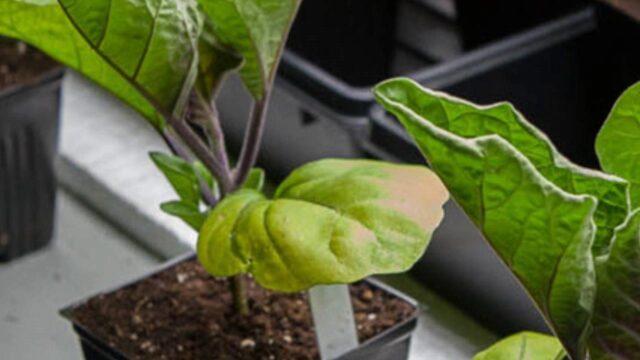
Leaves die due to boron deficiency
If similar signs are observed not only in eggplants, but also in other plants, this clearly indicates a lack of boron in the soil. It is worth considering that the microelement is well absorbed in a slightly acidic environment (pH = 5.5-5.8). If the soil has a neutral or even more alkaline reaction (pH greater than 7.0), it needs to be acidified. To do this, water the soil, for example, with a solution of 9% vinegar (100 ml per 10 liters of water per 1 m2).
How to feed eggplants with boric acid
To treat eggplants with boric acid for the ovary, you need to prepare a solution, carefully observing the proportions. How to correctly calculate the dosage is described in detail below.
Dosage of boric acid for eggplants
First of all, you need to learn how to accurately determine the concentration of the active substance. To carry out foliar treatments (spraying), it is necessary to prepare a solution based on a ratio of 2-2.5 g per 10 liters of water. Moreover, we are talking specifically about a pure substance - boric acid in powder form, which can be purchased at a store for summer residents or at a pharmacy.
To prepare a solution of boric acid, proceed as follows:
- Prepare hot, but not boiling water with a temperature of 60-70 degrees (your finger should already be burned). It is enough to prepare a volume of 1 liter.
- Measure out the required amount of boric acid - 2-2.5 g. You can weigh it or determine it “by eye” - from a third to half a teaspoon.
- Dissolve in a small volume of water, for example, a liter.
- Stir thoroughly until the boric acid crystals are completely dispersed.
- Next, bring it to a total volume of 10 liters - pour it into a regular bucket.
- Wait until the solution cools to room temperature.
- Pour into a spray bottle and begin processing.
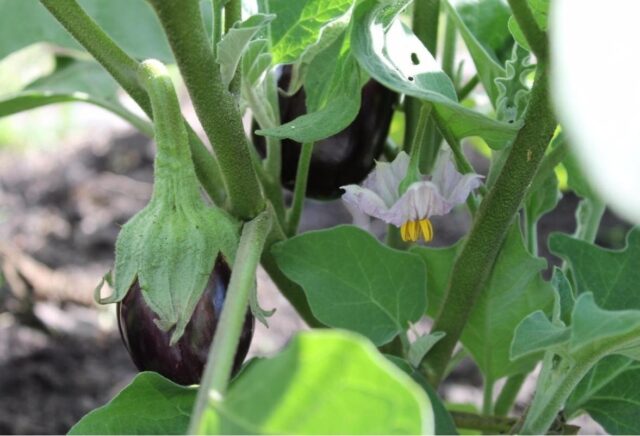
Foliar spraying is carried out at the stage of bud formation and flowering
Rules for using boric acid for eggplants
Eggplants are processed several times:
- Treating seeds - the day before sowing seedlings.
- Watering the soil on the eve of transplanting seedlings, for example, into a greenhouse.
- Foliar treatment during bud formation.
- The second foliar feeding of eggplants with boric acid for the ovary at the flowering stage.
- Spraying adult plants during the period of mass formation of fruits.
In all cases, a solution of the same concentration is used - 2-2.5 g per 10 l. To treat eggplant seeds, prepare 1 liter of working liquid - this is quite enough.They are kept for 24 hours and then sown in the ground.
A few days before transplanting the seedlings to an open bed or greenhouse, the soil in it is watered with a solution of boric acid, spending up to 10 liters per 1 square meter.
To form eggplant ovaries during the formation of buds and mass flowering, prepare a standard solution of 2 g per 10 l and carry out foliar treatment of the entire above-ground part. It is better to work in the late evening so that the daytime sun does not burn the leaves of the plants.
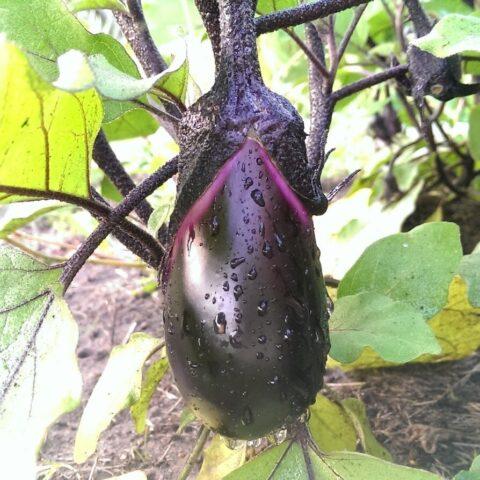
Thanks to boric acid treatment, the yield will be consistently high
Fruits are also treated with a similar composition at the beginning of formation. In the later stages, this must be done, since there will be no special effect. In addition, the last spraying of plants with preparations is carried out at least a week before harvesting.
Conclusion
Spraying eggplants with boric acid promotes the formation of ovaries, increases productivity and strengthens the plant. Acid must be used strictly following the indicated dosages. Plants should be treated at least twice a season - during the formation of buds and at the flowering stage. Thanks to this, you will be able to get a good harvest, and the fruits will be tasty and shelf-stable.

